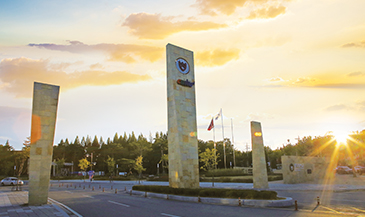CBT interviewed the Doyak campaign members as they are running for the Student Council election in 2020. The interview was conducted to help school members understand the campaign pledges and encourage them to vote.
First, a ‘barrier-free zone’ was set up at the university headquarters.
The ‘barrier-free zone’, for unrestricted movement, breaks down all physical and institutional barriers to create a society where the socially disadvantaged, such as the physically ill, elderly and disabled, are better off to live. Ramps were installed on all sidewalks, steps and split level areas to change it into a safe place. Kim Tae-hoon, a student using a wheelchair expressed his thanks as follows “Before the Barrier Free Zone was created, I often tripped over a hill and fell. However, I don’t worry about getting caught in the hill anymore, because the school has actively collected opinions and asked me about the inconveniences.” Also, the area allows cyclists as well as physically challenged students to ride bicycles safely. It also serves as a shelter for residents by installing landscaping and benches. As such, it is expected that CBNU members and residents will use it together to become a true barrier-free zone.
Also, there were small changes in each building on campus. It was one of the pledges of the student council, to provide all-in-one desks. The first and second replacements have been carried out and the third replacement is scheduled to take place soon. The following is the status of the replacement.
College of Humanities: 3 classrooms, 129 desks and chairs. College of Social Sciences: 4 classrooms, 317 desks and chairs. College of Natural Sciences: 4 classrooms, 142 desks and chairs. College of Business: 6 classrooms, 351 desks and chairs. College of Engineering: 8 classrooms, 432 desks and chairs. College of Electrical & Computer Engineering: 5 classrooms, 26 classrooms. College of Agriculture, Life & Environment Science: 13 classrooms, 645 desks and chairs. College of Education:2 classrooms, 80 desks and chairs/College of Human Ecology:1 classroom,44 desks, and chairs. Law School: 1classroom, 40 desks, and chairs. Hyungseolguan: 4 classrooms, 280 desks, and chairs. Total: 51 classrooms, 2724 desks, and chairs.
Kim Gun-il, policy director of the student council of the “do-yak” said. “As it has been a pledge of student councils of all time, Students’ discomfort could be much alleviated with all-in-one desks which has long been appealing. However, it failed repeatedly due to a lack of budget. Nevertheless, we did not give up and received a budget for the replacement of an integral desk from the undergraduate support department in October 2019, so the replacement process was carried out from January 2020. The second round of replacement was conducted in February this year upon request from each college. Unfortunately, we can’t replace all of our integrated desks, so we don’t have a third-round plan yet.”
Due to the influence of Corona 19, most public facilities in the school are closed or the hours of use are changed. ‘Hanbit’ Restaurant, Library, Second Student Center, Futsal Field, Small Stadium, and Tennis Courses on the first floor of the New Student Center are closed indefinitely until regular classes resume.
However, library loans and returns can be used at the entrance of the new library if requested separately, and the Starlight Restaurant operates as usual after installing partitions.
Finally, this news is focused on foreign as well as domestic media. A research team led by Choi Young-ki, a professor at CBNU of Medicine, used ferrets to verify the COVID-19 multiplication and propagation process in the human body in conjunction with the National Medical Center and Korea Research Institute of Bioscience and Biotechnology. Choi’s research team is the first to study COVID-19 with ferrets. A ferret is one of the few animals that cough and have a runny nose like humans. The research team isolated respiratory samples of patients with COVID-19 in Korea. They also figured out the spread of the coronavirus to the body’s tissues after injecting coronavirus into the ferret. From the second day, the ferret infected with coronavirus began to experience respiratory symptoms such as increased body temperature and coughing. Coronavirus was also emitted from its body fluids such as saliva, urine, and excrement as well as nasal secretions. Experiments had shown that ferret to ferret infection occurred on the second day after direct contact. The research team also confirmed that Ferrets were partially infected when they were in contact with droplets from infected ferret’s sneeze. Unfortunately, the test did not confirm whether the virus was spreading to the air. Choi’s study was published in the online edition of “Cell Host & Microbe.” Choi Young-ki (professor of Medical College) said, “Our research has been successful in the world’s first study about Coronavirus infection and transmission using animals. Using the results, we are currently conducting verification studies on coronavirus treatments with governments and pharmaceutical companies. This research is expected to be applied to the development of vaccines.”
So far, we have been in touch with campus news during untacted lectures. There were various news and changes on the quiet campus. CBT reporters hope that the coronavirus ends as soon as possible and that students enjoy their campus life in good health again.
Campus News
2020. 6. 8.
By Lee Dong-ah
By Kwon Ji-ye

